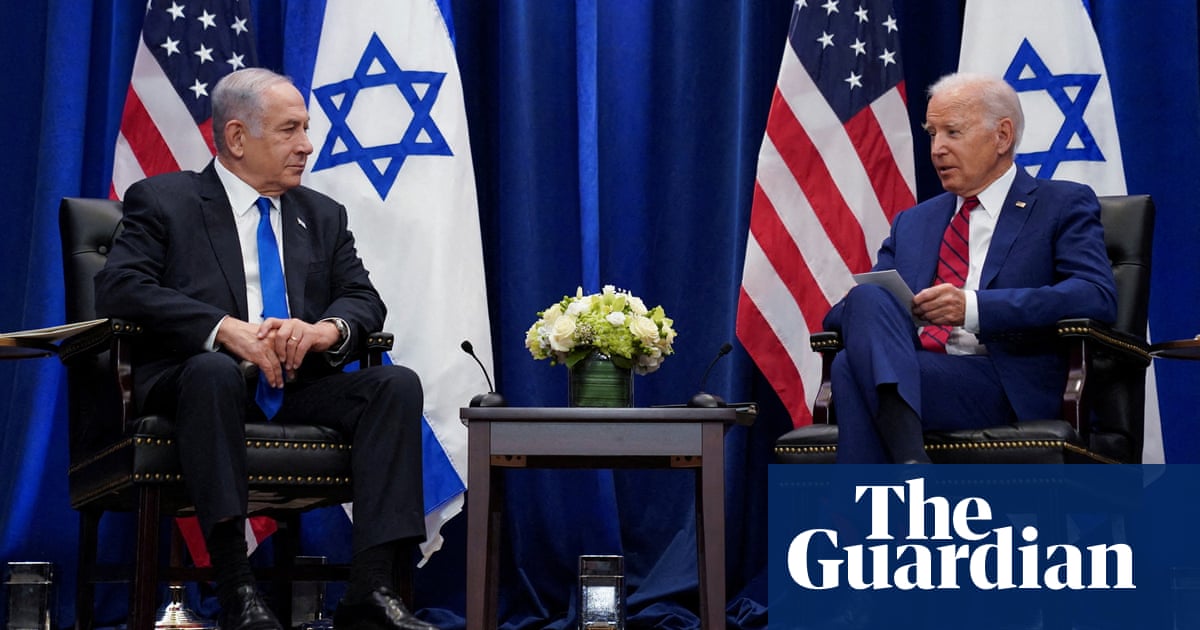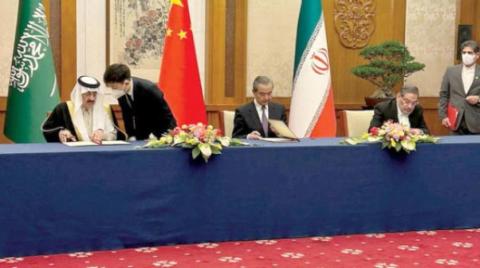
In a foreign policy speech last week, US President Joe Biden highlighted China as “our most serious competitor” and also expressed concern about Russia. As the Biden administration seeks to shape its policy toward the Middle East and North Africa (MENA), competition between the US, China and Russia will be a key factor.
Russia has a long history of involvement in the region. In between the fall of the Soviet Union and 2015, however, it had a very limited role. President Vladimir Putin’s decision to actively support Bashar Assad in Syria, including with military force, marked a change in Russia’s approach. Since then, Moscow has expanded relations with multiple countries, including the Gulf Arab states and Israel, and played a role in the conflict in Libya.
Moscow is pursuing several goals in the MENA region. Putin prefers stability. He opposes regime change and has no interest in the promotion of democracy or human rights. Russia also sees the Middle East as presenting an opportunity to push back on US power. It lacks the resources to fully supplant Washington’s role in the region, but it can undermine US influence and try to prevent other potential rivals from dominating. Russia’s increased role has also accrued leverage that it can use to pursue goals in other areas, such as Europe. Putin wants Russia to be a global player and his expansion of his country’s involvement in MENA has bolstered Moscow’s reputation as a power with global reach.
Russia also has economic and domestic political interests that drive its actions in the region. Oil and gas are crucial components of Russia’s economy and its relations with OPEC countries are very important. It also seeks to sell arms in the region and pursue other business links. Additionally, Putin has used Russia’s involvement in the region to burnish his own reputation at home, and his interest in opposing regime change is linked to his interest in his own political longevity.
China, meanwhile, has significantly expanded its economic and business relations in the region, with a focus on the Gulf Arab states. Beijing’s driving interests are economic, as it is the top importer of Gulf oil and has other business interests in the region. The Middle East plays a useful role in China’s Belt and Road Initiative.
It prefers to be an economic partner that remains neutral on regional political issues. Like Russia, it values stability. China wants to avoid the type of entanglements that have tripped up the US. It portrays itself as a reliable partner that does not interfere in other countries’ domestic issues.
China’s regional security role has slowly increased, including participating in anti-piracy missions and establishing a military base in Djibouti, but Beijing does not seek to replace the US as the regional security guarantor. China is happy to use Washington’s misadventures in the region to undermine America’s reputation, while avoiding taking on security responsibilities itself. In the future, China is likely to find it increasingly difficult to maintain and protect significant economic interests while remaining above the fray of regional politics.
With some adjustments, Biden will continue pursuing traditional US interests in the region. America has wide-ranging political and security interests, and Biden administration officials have talked about goals such as containing Iran’s nuclear program, ensuring the security of partners such as Israel and Saudi Arabia, using diplomacy to help end the wars in Yemen and Syria, and more. Biden also wants to pull out of “forever wars,” while continuing counterterrorism operations. While Biden will put human rights and democracy back on the list of US priorities, the administration will also have other priorities. Concerns about Russian and Chinese influence will be two of many factors that shape US policy.
America retains significant economic interests in the region, including extensive business interests. While it no longer needs Middle Eastern oil as it once did, the US has an interest in ensuring the security of the oil industry as part of the global economic system.
While it is clear that the MENA region will remain an arena for great power competition, it is less clear how people in the region feel about it. Recent Arab Barometer polling of Algeria, Jordan, Lebanon, Libya, Morocco and Tunisia provides a sense of the public’s perspectives.
Concerns about Russian and Chinese influence will be two of many factors that shape US policy under Biden.
Kerry Boyd Anderson
The survey found that people in these six countries had significantly more favorable views toward China than the US. However, the survey also found that people in the region are less familiar with Chinese foreign policy, so Beijing might face greater challenges if it takes on a more high-profile role. The survey was conducted before Biden became president and respondents tended to think that he would pursue policies that are better for the region than Trump, so China’s advantage might decline somewhat with Biden as president. The Arab Barometer survey found that Russia also receives higher favorability ratings in these six countries — typically lower than China but higher than the US.
Many MENA states will find advantages in concurrently pursuing relations with Russia, China and the US. However, just as the external great powers might find it increasingly difficult to balance relations with multiple regional rivals, regional powers might find it increasingly difficult to balance relations with the three great powers as their global interests collide.
Kerry Boyd Anderson is a writer and political risk consultant with more than 16 years of experience as a professional analyst of international security issues and Middle East political and business risk. Her previous positions include deputy director for advisory with Oxford Analytica and managing editor of Arms Control Today. Twitter: @KBAresearch
Disclaimer: Views expressed by writers in this section are their own and do not necessarily reflect Arab News" point-of-view












